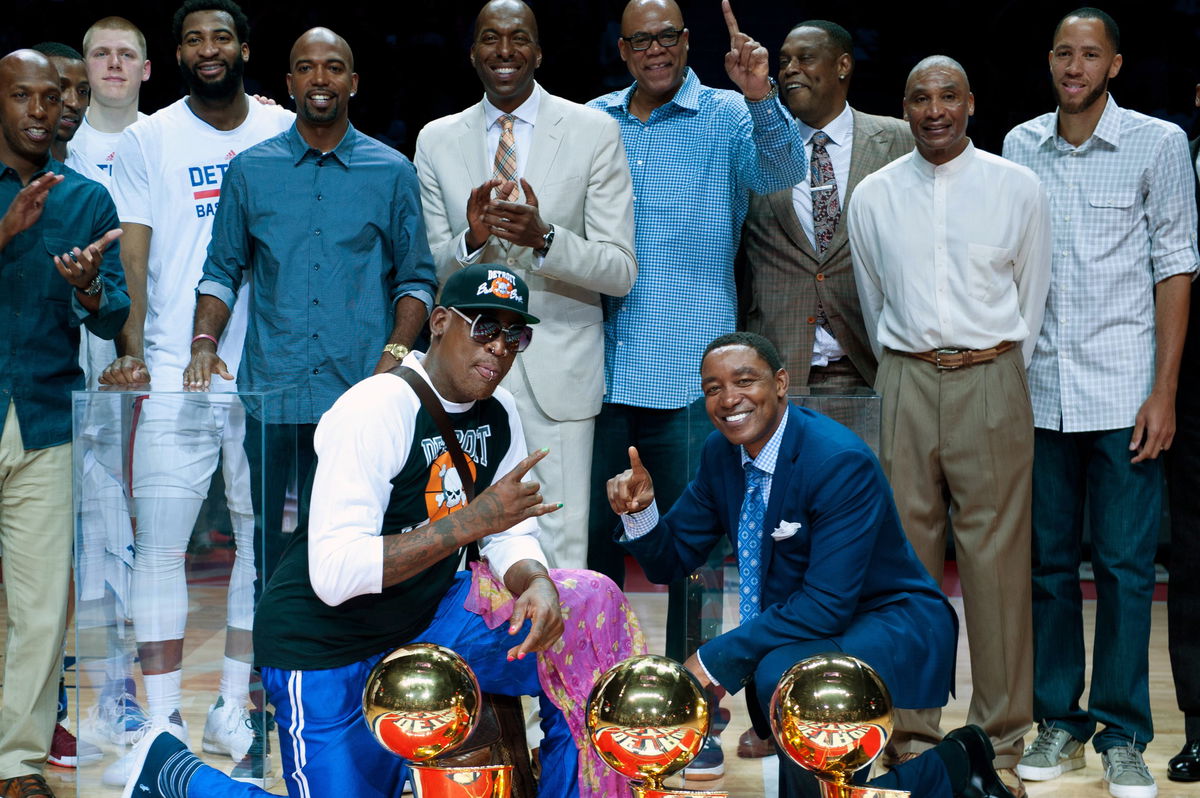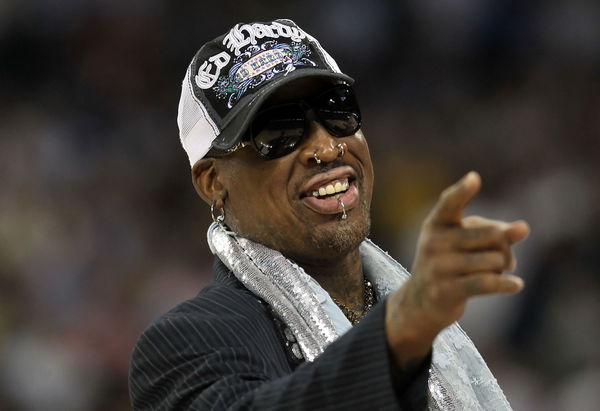
USA Today via Reuters
Apr 10, 2017; Auburn Hills, MI, USA; Detroit Pistons former players Dennis Rodman and Isiah Thomas pose during a halftime ceremony of a game against the Washington Wizards at The Palace of Auburn Hills. Mandatory Credit: Tim Fuller-USA TODAY Sports

USA Today via Reuters
Apr 10, 2017; Auburn Hills, MI, USA; Detroit Pistons former players Dennis Rodman and Isiah Thomas pose during a halftime ceremony of a game against the Washington Wizards at The Palace of Auburn Hills. Mandatory Credit: Tim Fuller-USA TODAY Sports

USA Today via Reuters
Apr 10, 2017; Auburn Hills, MI, USA; Detroit Pistons former players Dennis Rodman and Isiah Thomas pose during a halftime ceremony of a game against the Washington Wizards at The Palace of Auburn Hills. Mandatory Credit: Tim Fuller-USA TODAY Sports

USA Today via Reuters
Apr 10, 2017; Auburn Hills, MI, USA; Detroit Pistons former players Dennis Rodman and Isiah Thomas pose during a halftime ceremony of a game against the Washington Wizards at The Palace of Auburn Hills. Mandatory Credit: Tim Fuller-USA TODAY Sports
Dennis Rodman didn’t just play basketball—he studied it like a scientist that his close ones understand clearly. Behind the colorful personality and tabloid headlines was a calculated mind built for the art of rebounding like no other. And it wasn’t just fans who took notice—NBA legend Isiah Thomas found himself stunned by Rodman’s genius long before the rest of the world caught on.
Watch What’s Trending Now!
Fellow Hall of Famer asserts that the world will discover this brilliance. Reflecting on Rodman’s early years in Detroit, Isiah Thomas recounted an unforgettable moment to Ashley Nevel in an interview that stripped away the chaos and exposed the mind of a basketball genius. Thomas, a vocal leader of the “Bad Boys” Pistons, remembered one pre-game when Rodman skipped layup exercises. Instead, he stood off to the side, closely observing. When asked, Rodman responded in a way that astounded Thomas.
More than just a funny narrative, this event revealed the intellectual depth that made Rodman the most powerful rebounder of his generation. “Genius,” Thomas later called it. “That was genius on a whole another level.” One night during warmups, Thomas noticed Rodman skipping the team’s layup line. As the Pistons’ vocal leader, he stepped in to correct him. “I was like, hey man, you gotta get in the layup line,” Thomas recalled.
But Rodman calmly resisted. “No, I’m counting,” he said. Thomas assumed he meant players—after all, there were only 12. But Rodman clarified: “I’m counting the spins on every player’s shot. How many times the ball rotates, if it’s short, if it’s long… So I know where to go to get the rebound when you miss.” It was not a lack of effort. It was a superior readiness that was attired in quirkiness.
View this post on Instagram
This kind of thinking—that of the man who would lead the NBA in rebounds for seven consecutive seasons, post 34-rebound games, and clinch five NBA titles spanning two dynasties—foreshadowed the arc. But this same man, who once was known for his hunger and mentality on the court, would soon lose more than a step; he’d lose the structure that kept his genius from unravelling as the mental health struggle that affected him.
The Cost of Losing Chuck Daly and the Isiah Thomas Brotherhood That Held Dennis Rodman Together
Rodman’s transformation from misunderstood genius to misunderstood celebrity did not begin with fame, it began with a loss. During his early years with Detroit, he found more than a team; he found a family, and more specifically, a father figure in head coach Chuck Daly. Daly not only enhanced Rodman’s defensive intensity but also grounded his emotions that he quietly carried from his past, where instability and abandonment were constant patterns.
When Daly resigned on May 5, 1992, that emotional foundation cracked. “He shouldn’t be gone,” Rodman said at the time. “Losing a basketball game is not as important as losing the person you love and care about.” A scene that shook the NBA and represented the start of Rodman’s mental and emotional spiral, he was discovered lying down outside The Palace with a firearm on his lap within a year. Traded to the Spurs shortly after, Rodman entered a new phase of his career, the one that would be defined more by his struggles off the court than his dominance and legacy on it.
Despite later finding success with the Chicago Bulls and earning three more rings alongside the GOAT Michael Jordan and Scottie Pippen, the structure Rodman once had in Detroit was never fully replaced. The relationships with Daly, Thomas, and his Pistons brothers were priceless, as was the Rodman version driven just by basketball purity. Rodman was motivated by basketball purity even after Daly left. Thomas described: “Most guys come to the arena and say, ‘I need 20 points.’ Dennis? ‘I want 40 rebounds tonight.’” That mentality, Thomas believed, changed the way rebounding was valued. “Who thinks like that? Because rebounders weren’t getting paid. But Dennis—through his marketing genius and play—made it possible.”

Getty
HOUSTON, TX – APRIL 04: Naismith Memorial Basketball Hall of Fame 2011 inductee Dennis Rodman looks on during halftime of the National Championship Game of the 2011 NCAA Division I Men’s Basketball Tournament at Reliant Stadium on April 4, 2011 in Houston, Texas. (Photo by Ronald Martinez/Getty Images)
Rodman’s legacy remains untouchable in many aspects, be it rebounding titles, Defensive Player of the Year awards, All-NBA selections, or a Hall of Fame induction in 2011. But as Isiah Thomas’ recollection reveals, his legacy is also layered with the brilliance that was once nurtured with the Pistons before the fame and the emotional unrest, and the mental struggles he had to go through. That layup line was a foreshadowing of both the heights Rodman would reach and the personal battles that a top athlete faces off the court.

